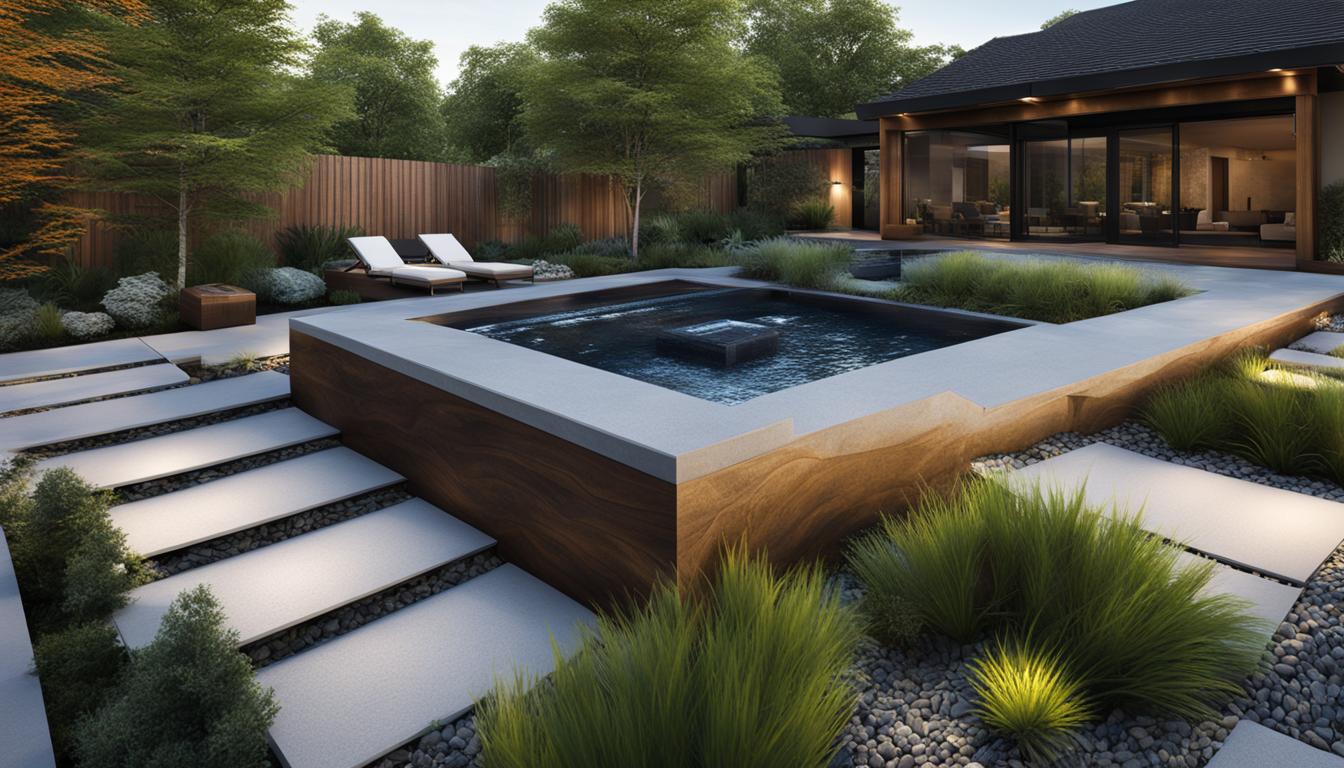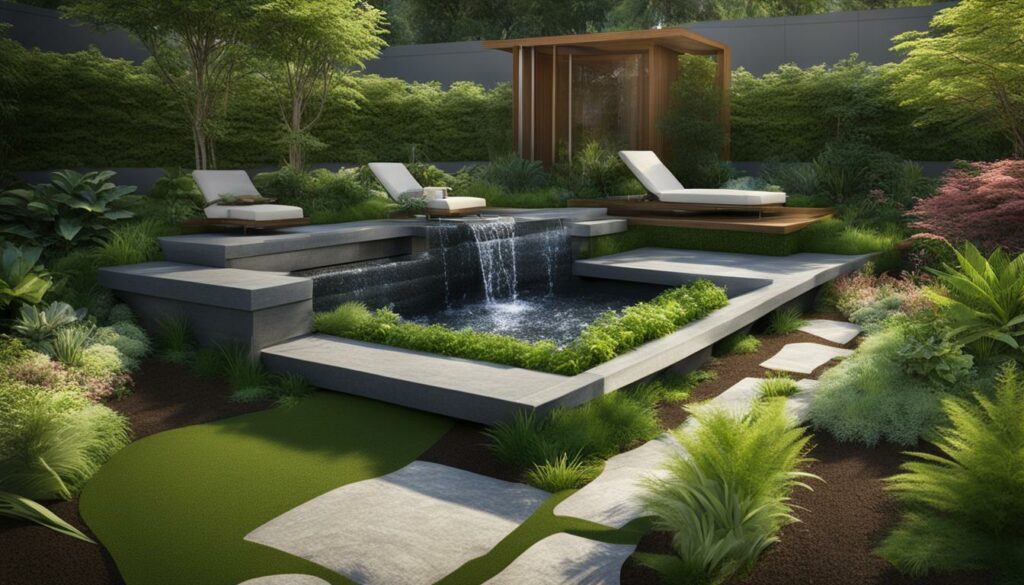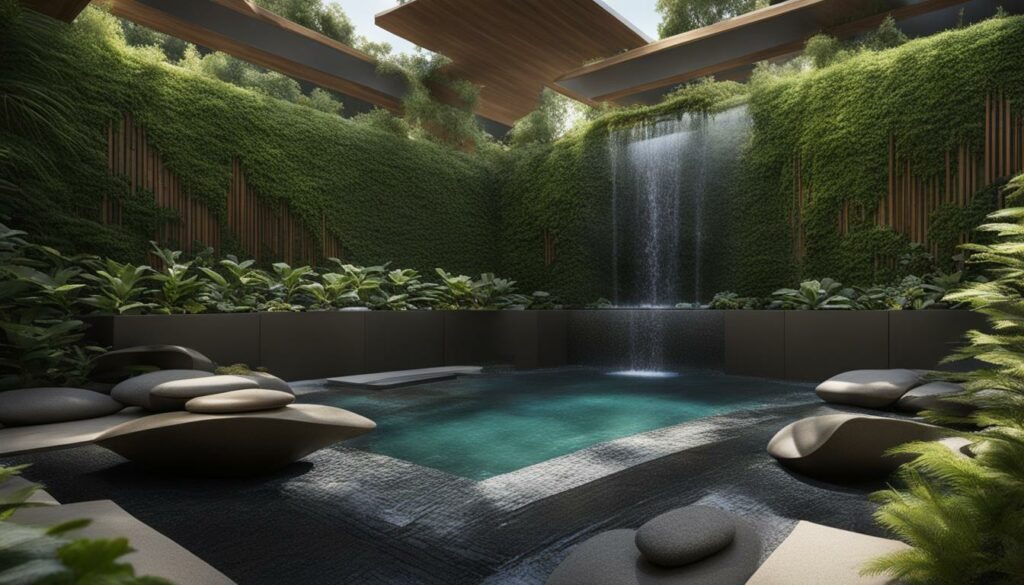
As we strive towards more sustainable living practices, preserving our natural environment has become a top priority. The integration of custom water features in landscaping design provides an opportunity to merge aesthetics with sustainability. These features offer both visual appeal and practicality, by helping to conserve natural resources while adding to the beauty of a landscape.
Custom water features can be designed to align with sustainable practices, such as utilizing native plants, embracing rainwater, and maximizing energy efficiency. By utilizing these eco-conscious design strategies, it is possible to create a sustainable oasis that is both visually pleasing and environmentally responsible.
Key Takeaways:
- Custom water features offer an opportunity to merge aesthetics with sustainability in landscaping design.
- Utilizing eco-conscious design strategies such as native plants, rainwater collection, and maximized energy efficiency, enhances the sustainability of custom water features.
- The benefits of custom water features include practicality through the conservation of natural resources and creating visual appeal.
The Benefits of Eco-Friendly Water Features
Eco-friendly water features not only add a touch of elegance to a landscape, but they also offer numerous benefits that contribute to creating environmentally friendly and sustainable landscapes.
Water Conservation
One of the significant advantages of eco-friendly water features is the promotion of water conservation. By utilizing water-saving technologies such as drip irrigation systems and recirculating pumps, these features reduce water consumption significantly.
“The Recirculating pump is one of the most efficient technologies that eco-friendly water features use. It saves water by continuously cycling the water in the feature, reducing evaporation and minimizing the need for filling the feature regularly.”
Green Landscaping
Eco-friendly water features align with the principles of sustainable landscaping. By incorporating native plants, they provide an ideal habitat for wildlife and attract beneficial insects, promoting biodiversity. Moreover, they offer a sustainable solution to keep greenery alive during droughts, reducing the need for excess water usage.
Aesthetic Appeal
Eco-friendly water features come in various designs and styles, providing an array of choices that cater to any taste and preferences. Besides, they add value to a property and create a serene environment that promotes relaxation and calmness.
Overall, eco-friendly water features prove to be a valuable addition to any landscape design, contributing to water conservation efforts, sustainable landscaping, and aesthetic beauty.
Custom Water Features for Sustainable Landscaping
Custom water features can play an essential role in creating sustainable landscapes that are both beautiful and eco-friendly. By incorporating environmentally friendly water features into your landscape, you can reduce water waste and minimize the negative impact on the natural environment. To design custom water features that align with sustainable landscaping practices, several factors must be considered.
Integrating Native Plants
Integrating native plant species into a custom water feature design is an effective way to promote sustainability. Native plants are naturally adapted to the local environment and require less water and maintenance. This approach can help to minimize the use of fertilizers and herbicides, create a harmonious ecosystem and preserve the natural surroundings.
Using Rainwater Collection Systems
Another significant aspect of designing custom water features with sustainability in mind is incorporating rainwater collection systems. These systems capture and store rainwater, which can then be used to irrigate the landscape. By using rainwater instead of potable water, you can conserve a precious resource and reduce the strain on municipal water supplies.

Minimizing Environmental Impact
Custom water features can be designed to minimize their environmental impact by employing certain sustainable practices. For example, using sustainable building materials and eco-friendly construction techniques can help reduce the carbon footprint of the project. Additionally, incorporating renewable energy sources such as solar power can reduce the need for energy from non-renewable sources.
Overall, custom water features can contribute to creating sustainable landscapes when appropriately designed and implemented. By incorporating native plants, rainwater collection systems, and sustainable building practices, you can achieve a beautiful and environmentally friendly landscape that functions in harmony with nature.
Solar-Powered Water Features: Harnessing the Sun's Energy
Incorporating solar-powered water features can be a game-changer for sustainable landscaping. By harnessing the power of the sun, you can bring your outdoor space to life without relying on non-renewable energy sources. Solar-powered water features have a low environmental impact, making them an excellent addition to any garden looking to reduce its carbon footprint. Moreover, they are energy-efficient and require minimal maintenance.
One of the significant advantages of solar-powered water features is their ease of installation. They do not require complicated wiring or electrical connections, making them accessible to virtually any landscape layout. With the use of a solar panel, they can absorb energy during the day and store it in a rechargeable battery, providing power to operate the pump and keep the water feature functional at night.
In addition, installing solar-powered water features is an excellent way to create a green landscaping project and showcase a sustainable commitment. As homeowners increasingly look for eco-friendly solutions to beautify their outdoor spaces, custom water features that use solar power are becoming more popular.
Overall, incorporating solar-powered water features in creating sustainable landscapes is an innovative solution that brings beauty and functionality together while minimizing the environmental impact. By harnessing solar energy, it is possible to create beautiful outdoor spaces while preserving natural resources and reducing energy costs.
Rainwater Features: Embracing Nature's Gift
Incorporating rainwater features into sustainable landscaping offers an opportunity to embrace nature's gift while promoting water conservation. These features can collect and utilize rainwater, reducing the dependence on traditional water sources, and benefiting both the environment and your wallet.
By capturing rainwater, these features minimize stormwater runoff, reducing the load on community stormwater systems and local waterways. This contributes to preventing flooding, erosion, and water pollution, enhancing the overall health of the ecosystem. Additionally, rainwater features support the establishment of diverse plant communities, offering a source of water to native species and contributing to the overall biodiversity of the landscape.
Embracing rainwater features also promotes sustainable landscaping by reducing water waste and conserving resources. These features can be designed with a range of water-saving strategies, such as utilizing drip irrigation, incorporating native plants, and minimizing water loss through evaporation. Moreover, these features can facilitate the replenishment of groundwater, which has a crucial role in supporting aquatic ecosystems and providing drinking water.

Rainwater features not only enhance the visual appeal of your landscape but also promote sustainability by conserving this precious resource. By emphasizing the importance of rainwater features, you can create an eco-friendly oasis while reducing your water bills and promoting the health of our environment.
Emphasizing Water Conservation in Custom Water Features
Water conservation is a critical aspect of designing and maintaining custom water features that align with sustainable landscaping practices. Incorporating strategies and technologies that promote water conservation not only helps preserve this precious resource but also reduces the environmental impact and overall maintenance costs of these features.
Strategies for Water Conservation
- Utilizing a recirculation system to minimize water waste
- Using drought-tolerant plants in and around water features
- Designing features that capture and store rainwater
- Implementing efficient irrigation systems to water surrounding landscaping
- Reducing the frequency of water feature cleaning and maintenance
By incorporating these strategies, it is possible to significantly reduce the amount of water used in custom water features and ensure they are aligned with sustainable landscaping practices.
Technology for Water Conservation
Advancements in technology have made it easier than ever to design custom water features that prioritize water conservation. For example, smart water sensors and weather-based irrigation controllers can help optimize water usage by automatically adjusting water flow based on real-time weather conditions. Similarly, using variable speed pumps that allow operators to adjust water flow rates can help reduce water usage while maintaining optimal performance.
By utilizing these technologies, it is possible to create highly efficient custom water features that minimize water usage and help preserve this valuable resource.
“Conservation is an ethical obligation, not just an environmental issue.” -Richard J. Jackson
In conclusion, water conservation is a fundamental aspect of sustainable landscaping and designing custom water features. By implementing effective strategies and utilizing technology that promotes water conservation, it is possible to create beautiful and environmentally conscious landscapes that prioritize this precious resource.
Conclusion
In conclusion, custom water features are an excellent addition to any sustainable and green landscaping design. They not only enhance the aesthetic appeal of a space but also promote eco-consciousness and sustainability. By incorporating eco-friendly water features such as solar-powered and rainwater features, we can reduce our carbon footprint and conserve water resources. It is essential to emphasize water conservation in the design and maintenance of custom water features, promoting efficiency and minimizing water usage.
Overall, custom water features are a perfect way to merge aesthetics with sustainability, creating a serene and eco-friendly oasis. As we strive towards a greener future, incorporating sustainable practices in our landscaping designs such as custom water features is a step in the right direction. Let us embrace the beauty of nature and promote sustainability through our designs.








